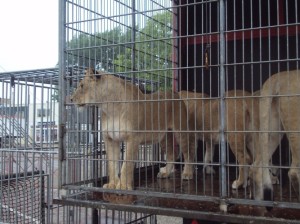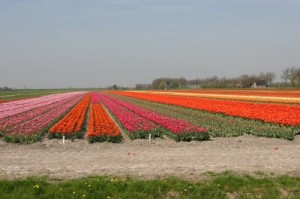Worldlog săptămâna 52 -2014
Săptămâna aceasta am avut o mare reușită în ceea ce privește bunăstarea animalelor în Țările de Jos. Începând cu 2015 va fi interzis orice fel de spectacol de circ incluzând animale sălbatice. Această reglementare a fost anunțată încă din 2012. În Mexic s-a adoptat săptămâna aceasta o interdicție similară! Chiar de atunci am susținut o astfel de interdicție și bineînțeles că suntem fericiți de această veste. Sunt totuși surprinsă că lamele, cămilele, alpacalele și dromaderii nu sunt incluse și vom adresa cu siguranță întrebări secretarului de stat în această privință.
Ce îmi mai trezește atenția este motivul cu care interdicția a fost anunțată: guvernul a precizat drept motiv al legii că amuzamentul omului nu poate justifica deteriorarea integrității animalelor. Nu numai bunăstarea animalelor, ci și respectul animalelor în sine sunt deci motive pentru o decizie legislativă de a impune o anumită conduită în ceea ce privește tratamentul față de animale. Aceasta reprezintă o piatră de hotar pentru guvern în ceea ce privește bunăstarea animalelor și sper ca acesta să privească și alte chestiuni din aceeași perspectivă. În orice caz, pentru asta ne vom strădui!
Și mai multe vești bune! La Camera Deputaților a fost un vot majoritar pentru moțiunea noastră de a limita utilizarea otrăvii în spațiile verzi. Fermele de bulbi și alte recolte pentru care se folosește multă otravă nu vor mai fi permise în apropierea spațiilor verzi. Deși guvernul are sarcina legală de a menține activitățile dăunătoare departe de natura fragilă, acesta nu s-a ocupat până acum de fermele de bulbi. Astfel, ani la rând pesticidele otrăvitoare au afectat natura, în vreme ce aceasta trebuia de fapt protejată. Este acum de datoria provinciilor să controleze utilizarea otrăvii.
Ultima săptămână de dinaintea vacanței de Crăciun a fost una plină de evenimente pentru politica neerlandeză. Senatul (inclusiv senatorul nostru) a votat împotriva legii care restricționează liberul arbitru al doctorilor. Majoritatea împotrivă s-a format deoarece trei senatori ai partidului PM (Partidul Muncii) au votat pe neașteptate împotrivă. Partidul Muncii a promis în timpul alegerilor că va avea în vedere procesele pieței libere, iar această lege (o dorință a partenerului de coaliție PPLD – Partidul Popular pentru Libertate și Democrație) este puțin diferită de această promisiune. Guvernul s-a înfuriat și a exercitat o presiune fără precedent asupra membrilor parlamentului pentru ca aceștia să fie totuși de acord cu planul dezastruos care prejudiciază drepturile pacienților. A urmat o criză și s-a căutat în mod diligent o soluție.
Criza guvernului nu este o surpriză. Partidele acestuia sunt poluri ideologice opuse unul față de celălalt. Dorința de a continua să fie la putere (din ceea ce reiese din poll-uri, amândouă stau la fel de prost – două treimi din votanți nu își mai doresc acest guvern) este așa de mare încât a fost nevoie să întocmească un plan pentru a lăsa, la nevoie, parlamentul pe margine pentru ca legea să fie acceptată.
Nu oamenii, ci banii sunt cei mai importanți pentru sistemul de sănătate neerlandez din ziua de astăzi. Aceasta reiese și din închiderea iminentă a singurului centru de bătrâni vegetarieni din Țările de Jos. Și despre aceasta am adresat întrebări parlamentare.
În urma unui sondaj de săptămâna aceasta reiese că particulele ultrafine emise de avioane reprezintă un pericol mult mai mare decât am crezut inițial. Pe lângă poluarea mediului, acestea prezintă riscuri de sănătate pentru locuitorii din apropiere. Secretarul de stat ne-a anunțat să fim pregătiți pentru a efectua cercetări suplimentare, însă nu a putut fi de acord cu luarea de măsuri preventive. În orice caz, rezultatele au fost destul de îngrijorătoare iar această politică pasivă este foarte neglijentă!
Această conversație cu Tim Jacskon, profesor britanic de dezvoltare durabilă, despre dilema creșterii economice este foarte interesantă. Ne putem menține prosperitatea fără creștere economică? Tim Jackson este convins că se poate, și mai ales că trebuie să se întâmple de dragul planetei.
În atenția sărbătorilor ce urmează, membri activi ai Partidului pentru Animale au împărțit în toată țara fluturași ce conțineau o rețetă vegetariană și o dorință prietenoasă de Crăciun. Sper din toată inima că oamenii vor reacționa la acest gest și vă doresc de asemenea un Crăciun fericit și un An Nou sănătos și fericit!
Marianne
This week, there was a major breakthrough for animal welfare in the Netherlands. As from 2015, it is truly prohibited to make wild animals perform in circuses. This prohibition was announced in 2012 already and it took a long time. The same prohibition was adopted in Mexico this week! Since our foundation we have called for the prohibition of animals in circuses and we are, therefore, very pleased with this result. But I am very surprised that camels, lamas, alpacas and dromedaries do not fall under this prohibition and we will put questions about this to the State Secretary.
But what is even more striking to me is the ground on which the prohibition is imposed: the reason given by the cabinet for the legislative proposal is that entertainment for people cannot justify violation of animal integrity. Thus, not only animal welfare but also respect for the animal itself is the basis for a legal act to ban performances with animals. This marks a milestone in the government’s policy on animal welfare and I hope that they will look at other issues the same way. We will work hard to achieve this in any case!
More good news! A majority of the Lower House voted in favour of our motion to curtail the use of toxins around nature areas. The growing of bulbs and other cultivations for which large amounts of toxins are used will no longer be permitted unjustifiably. Although, by law, the government has the task to eliminate damaging activities in vulnerable nature areas, it did not yet interfere with the growing of bulbs. This way, toxic pesticides have damaged nature areas for years, while in fact they should have been protected. It is now up to the provinces to restrain the use of toxins.
The last week before the Christmas recess was an eventful week in Dutch politics. The Senate (including our Senator) voted against the legislative proposal that limits the free choice of doctors. The majority arose because three senators of the governing party the Labour Party (LP) unexpectedly voted against the proposal. The LP promised during the elections that it would stop market forces in the care sector, and this legislative proposal (the wish of the coalition party People’s Party for Freedom and Democracy (PPFD)) is contrary to this promise. The Cabinet was furious and exerted unprecedented pressure on the people’s representation to still say yes to the ill-fated plan to affect the patients’ law. A crisis followed, and they diligently searched for a solution.
The cabinet crisis is not surprising. The governing parties are each other’s ideological counterparties. The wish to continue to govern (they both are dramatically low in the opinion polls, two third of the voters no longer want this government) is so great that in the end they came up with a trick that would sideline the parliament, if necessary, to push the legislative proposal through. The debate on this went on till early in the morning.
The focus is on money instead of people in the current Dutch care policy. This is also evident from the threat to close the only vegetarian care centre for the elderly in the Netherlands. I have, therefore, asked parliamentary questions on this.
This week, research showed that the emission of ultrafine particles by aircrafts is much higher and more harmful than thought. In addition to environmental pollution, it also causes health risks for people living in the direct vicinity. The State Secretary promised us to be willing to conduct follow-up research, but was not prepared to take precautionary measures. These reports are however very alarming and the wait-and-see policy is highly negligent!
This interview with the British professor of sustainable developments on the dilemma of economic growth is very interesting to watch. Can we maintain our welfare without economic growth? Tim Jackson is convinced that we can, and that it should be done in the interest of the earth.
With the festive season coming up, many active members of the Party for the Animals handed out flyers in the Netherlands with a vegetable recipe and animal-friendly Christmas greetings. I sincerely hope that many people will respond to this and I wish you all a merry Christmas and a healthy, happy 2015.
Marianne

